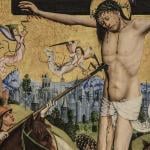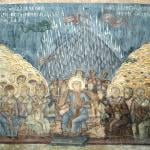This year marks the 1700th anniversary of the Nicene Creed. This statement, which has been confessed in Christian churches ever since, was formulated by a council of bishops who met in the city of Nicaea in present-day Turkey from May 20 (the date I wrote this) through August, 325 A.D., to work out what Scripture teaches about the Trinity and to deal with the teachings of Arius, who maintained that Jesus was not fully divine.
Patristics scholar Adam Renberg has written a post for the Anxious Bench, a Patheos blog from Christian historians, entitled Nicene Worship: Then and Now. He reminds us that the Nicene Creed was not just a matter of theological abstractions. Rather, it had to do with worship. He writes,
Worship of God is not only about heart posture, but also about proper belief. To misunderstand the object of our worship is to worship something other than the true God. In other words, orthodoxy must (at least in one dimension) be tied to proper understanding of God, and heresy is therefore derivation from suitable belief. Heresy is idolatry, insofar as it worships something other than the Christian God.
That is to say, worship raises the question, Who are you worshiping? What God do you worship? This was especially an issue in the early church, when people in the Greco-Roman world might worship any number of gods. But it surely applies today as well. This is why “interfaith” services, which invoke the incompatible deities of multiple religions, are so problematic. And in today’s climate, when individuals are encouraged to formulate their own personal “spiritualities”—featuring privately-defined deities, the self as god, or no god at all—communal worship becomes impossible.
Renberg describes the Nicaean approach:
When the bishops gathered at Nicaea, one of the goals was to articulate an orthodox understanding of God and they accomplished this in a twofold manner through the creed. First, they developed the creed to summarize the basic beliefs of the Christian Church: the relationship of the Father to the Son, the salvific work of Christ, etc. Second, they expressed these core tenants in such a way that other views were excluded—namely, Arius’. That is to say, the bishops drew the boundary lines of orthodoxy in this document.
That’s a great phrase: “the boundary lines of orthodoxy.” The church needed to know, who is worshiping the God of the Bible—that is, the Father, the Son, and the Holy Spirit—and who is not? A related question is, with whom do we share a common faith? And another: with whom may I worship?
Do you think the Nicene Creed provides sufficient “boundary lines of orthodoxy” today? Some conservative Christians say that agreement on the Nicene Creed should be sufficient for church fellowship, as it was in the early church.
But clearly, many more heresies have arisen since the time of Arius. And many more doctrinal controversies have arisen, even among those who worship the Triune God and confess the deity of Christ. Is the Pope the head of the church? In 1054, the Eastern orthodox said, “no,” as would the Protestants five centuries later. Is salvation a matter of accumulating merits (Catholicism), theosis (Eastern Orthodoxy), or faith in Christ? Does baptism regenerate and is Christ actually present in Holy Communion (yes, say Catholics, Orthodox, and Lutherans; no, say most Protestants). Protestants also have significant differences among themselves over such things as the Holy Spirit, the nature of faith, the authority of Scripture, the office of the ministry, and the definition of the Gospel, to name a few.
It’s hard to imagine a common, unified, collective worship in light of disagreements such as these. The different theological traditions can be said to have their own “boundary lines of orthodoxy” that define those traditions. Perhaps we can say that those who confess the Nicene Creed, for all of their important differences, do worship the same Triune God, acknowledge the same Jesus Christ as true God and true Man, and hold to the basic facts about creation, redemption, and sanctification. This is a significant agreement. And it is especially important today when, as Renberg says, so many self-identifying Christians—including ostensibly conservative and evangelical Christians—do not believe what the Nicene Creed confesses! Renberg writes,
What are the proper boundary markers for worship in the Church? For around 1650 years, Nicaea has been the standard articulation of trinitarian orthodoxy for the church, with the creed being used in worship regularly from at least the sixth century onwards. In other words, the majority of Christians have affirmed that Nicaea describes who the Christian God is. But recent trends demonstrate that a Nicene understanding of God is quickly being forgotten. A survey in 2022 seemed to indicate that up to 53% of Christians and 27% of evangelicals in the US agree or somewhat agree with the statement that “Jesus was a great teacher, but he was not God.”
Not to mention the church bodies that consciously hold to positions that violate the Creed, from liberal theologies that reject the Creation, the Incarnation, and the Resurrection of Christ to evangelicals who would have a hard time with “I acknowledge one baptism for the remission of sins.”
So today, after 1,700 years, it would be good for Christians and their churches to rally around the Nicene Creed—confessing it, teaching it, and reflecting on the significance of each of its articles.
Illustration: First Nicea Council Icon from Protatos Church, 1770 via Picryl, Public Domain












